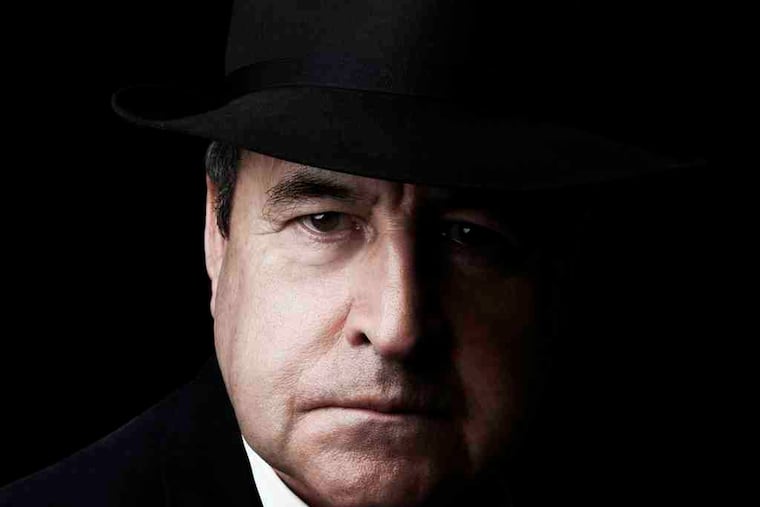Ireland, with sleuth Quirke, stars in tale of tycoon's death
John Banville distinguishes between the artistic pleasure he derives from the literary novels he writes under his own name and the craftsman's pleasure he gets from the crime fiction he writes as Benjamin Black. This makes it fair to ask a craftsman's questions about the Black books: How well do the parts fit together? How smoothly does Black execute them? Are they beautiful? Do they work? Does the finished product perform the functions essential to an object of its kind?

By Benjamin Black
Henry Holt & Co.
310 pp. $25
nolead ends nolead begins
Reviewed by Peter Rozovsky
John Banville distinguishes between the artistic pleasure he derives from the literary novels he writes under his own name and the craftsman's pleasure he gets from the crime fiction he writes as Benjamin Black. This makes it fair to ask a craftsman's questions about the Black books: How well do the parts fit together? How smoothly does Black execute them? Are they beautiful? Do they work? Does the finished product perform the functions essential to an object of its kind?
In A Death in Summer, Black's fourth novel featuring the one-named Irish pathologist Quirke, the answers are mixed. Banville creates a fine, menacing sense of place, an expectation of crime fiction at least since Raymond Chandler. He also does a decent, workmanlike job of throwing up red herrings, plausibly obnoxious suspects in the puzzle that drives the plot: the death of a newspaper tycoon in 1950s Dublin.
Quirke has angst about family, alcohol, and women, familiar credentials for a fictional sleuth, but with dollops of guilt about - well, in Black's 1950s Ireland, everyone is guilty. Everyone knows everything, no one says anything. The rich sneer knowingly; the poor slouch, downcast, sullen, close-mouthed, beaten- down, resentful. That's tough territory for anyone whose job is to ask questions and find answers. The place is decidedly the star in this book.
Elsewhere, Banville has more trouble. He has said that he vowed to avoid cliches when he set out to write crime fiction, but he indulges in two of the oldest at the very start:
(a.) A murder clumsily staged to suggest suicide
(b.) An outsider who sees what police miss (or a semi-outsider in this case; Quirke works with the police, but he's not a detective). This may literally be the oldest trick in the crime-fiction book, dating at least as far back as Edgar Allan Poe's short story "The Purloined Letter" in 1844.
Banville, gifted though he may be when wearing his literary hat, has an uneasy relationship with crime-fiction conventions, even as he acknowledges their necessity to the genre. Early in A Death in Summer, he gives us a nervously beautiful interview between Quirke and a suspect's desperate wife. The woman is shrunken, shabby, wheedling, put-upon, and bitter. Quirke grows impatient with her whining. The scene is harsh, edgy, and real - until Banville pulls out another cliche: The woman lets slip a detail that contradicts something Quirke had previously heard from another interested party.
Banville's unease with the convention is only emphasized later when, in a rare meta-moment, he has another character make fun of it:
"Sumner clamped a hand to his mouth and stared at the policeman with rounded eyes. 'Oh, Lord,' he exclaimed, 'now I've done it - I've let slip a vital clue.' "
Banville is new to writing crime (his conversion came when he read a few of Georges Simenon's non-Maigret "hard novels" in 2003), and he has strangely constricted ideas of its possibilities. "For some reason," he has said, "the conventions of crime fiction don't allow for humour."
Declan Burke, Ken Bruen, and Adrian McKinty, to name just three crime writers among Banville's fellow Irishmen, make humor an effective, non-smart-alecky part of their work. So do Christopher Brookmyre in Scotland, Malcolm Pryce in Wales, Harri Nykanen in Finland, Håkan Nesser in Sweden, Fred Vargas in France, and Andrea Camilleri in Italy. Donald Westlake, who, as Richard Stark, wrote the Parker novels that Banville admires so much, wrote comic caper novels about a smart but luckless thief named John Dortmunder.
So, how to regard Banville's crime writing? Perhaps as a work in progress. For an author given to extreme expressions of self-regard and self-loathing, he can be surprisingly playful when it comes to Benjamin Black. Black, the 65-year-old Banville is quoted as saying in a recent book about Irish crime writing, is "still relatively young. . . . I may end up making a fool of myself. On the other hand, I have this notion that there'll be a dictionary of Irish writers published in 2050, and under 'Banville, John,' it'll say, 'See Black, Benjamin.' "